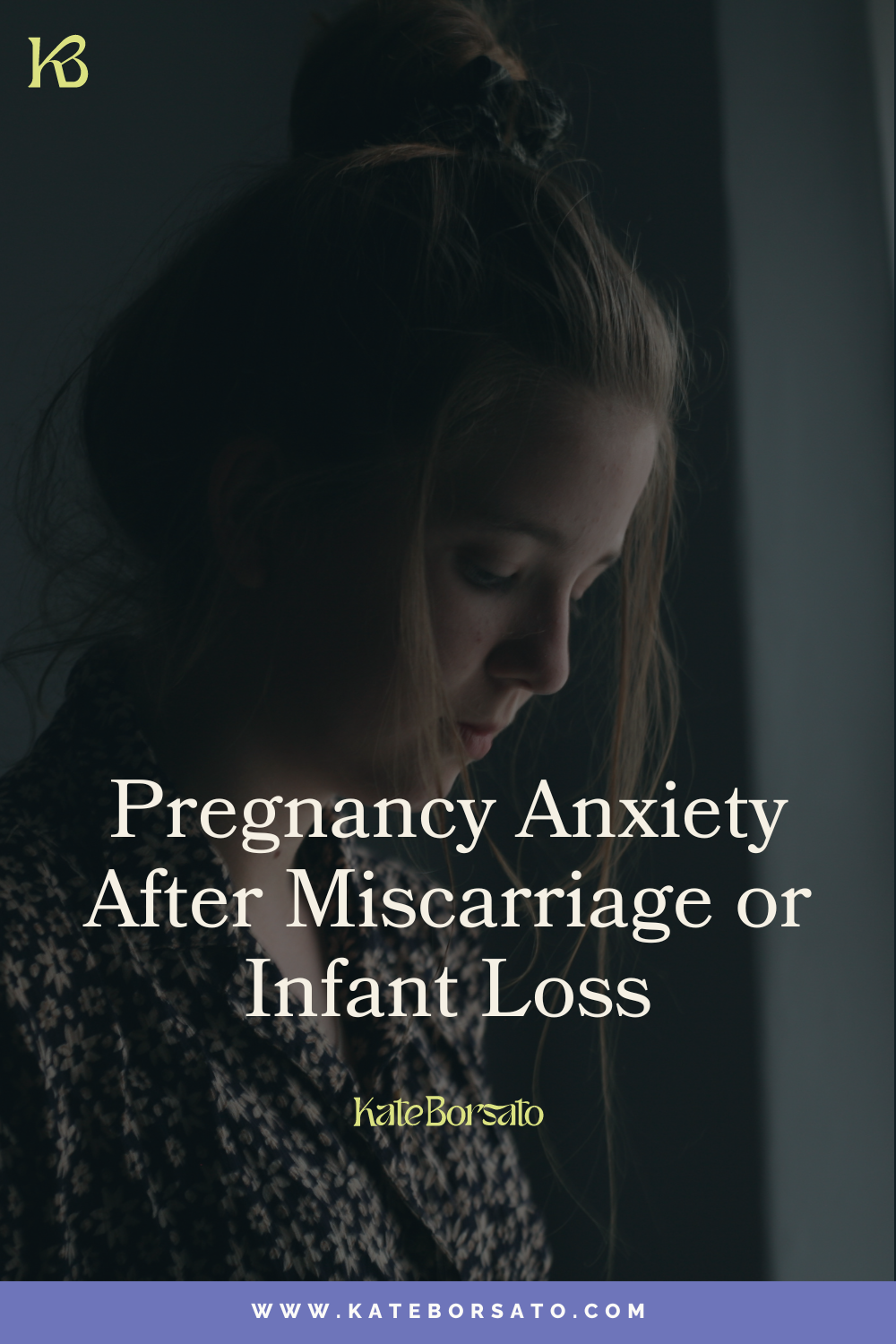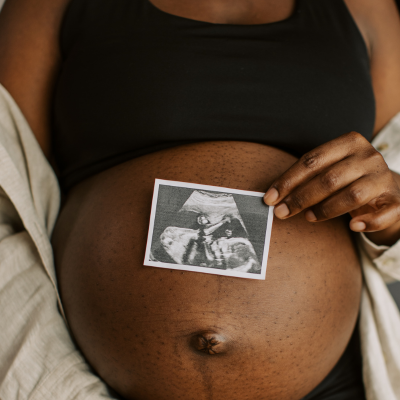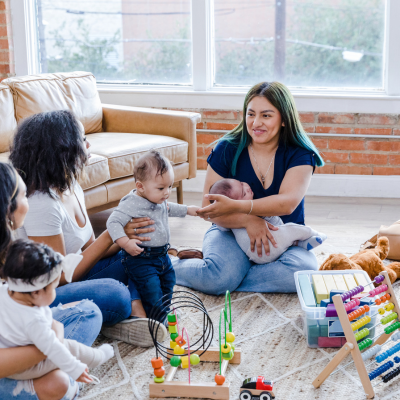Real women express what it’s like to be pregnant after having experienced miscarriage(s) or infant loss. If you’re part of this community, you may be sharing some of these feelings right now.
Becoming pregnant after having experienced miscarriage can be an incredibly difficult experience that is often not spoken about. The heartbreak that occurs with such a huge loss is something that many women carry with them for their entire life. It’s an understatement to say that this trauma is a tough, life-changing experience. Oftentimes, the wounds are left unhealed.
When we experience the loss of a baby, conceiving and going through another pregnancy afterwards can bring on so many emotions. Most women in this situation experience high levels of pregnancy anxiety after miscarriage. This can be during the early stages of their pregnancy, the entire time, and even for periods after birth. This is so understandable but it’s also so hard to deal with.

If this speaks to the experience that you’re currently living with, and you’re looking to understand your own situation better, consider the below sentiments and words expressed by real women who have been through this heartbreaking journey. If you’ve experienced miscarriage or infant loss, these are some of the ways you may be feeling right now. Whether you relate to one or all of these, know that your experience is valid.
You’re holding your breath and can’t seem to relax.
Many women who have already had at least one miscarriage feel that the first trimester is especially anxiety inducing. For a large group, that feeling lasts all the way through to the end of their pregnancy and even beyond. You might describe this feeling as “holding your breath,” “waiting for the other shoe to drop,” “not being able to relax,” or “waiting for bad news.” This is one of the most voiced experiences amongst those in this community. It may even feel surreal to know that you’re pregnant again after having gone through the trauma of miscarriage.
What moms said:
“I couldn’t rest a single day until my second trimester. It was the highest anxiety of my life.”
“I didn’t feel like my pregnancy was real and waited for bad news the whole nine months.”
“I felt like I was holding my breath for the whole time waiting for the other shoe to drop.”
You worry non-stop between doctor’s appointments.
When you’ve already lived the worst-case scenario with a past pregnancy or multiple pregnancies, it can feel that the same experience is going to replay itself again.
Your anxiety might focus on getting bad news at the next doctor’s appointment. If you have lost a pregnancy before, you might notice that you worry incessantly in between check ups. This worry might be alleviated temporarily when an ultrasound or test shows that everything is fine, however that relief may just be temporary before it builds again. This cycle might last weeks or it may continue for the entire nine months.
What moms said:
“At every doctor’s visit or milestone, I was just waiting for something to go wrong.”
“Every appointment was stressful. Doubt and fear would sink in.”
“I had PTSD at every appointment and scan because of our past experience.”
You can’t actually be happy about the pregnancy because anxiety overrides joy.
This is a concern that so many perinatal therapists, counselors and doulas often hear. Pregnancy after loss can feel so horrible because losing a past pregnancy can get in the way of feeling happy about your current one.
So many women say that they can’t allow themselves to feel happy because they don’t want to get attached and feel heartbroken all over again. If this is your experience, you might notice yourself thinking something along the lines of, “I don’t want to get ahead of myself,” or “I don’t want to get my hopes up this time.”
What moms said:
“I didn’t want to get ahead of myself. I told myself, ‘I can be happy when I reach X weeks.’”
“Exciting moments (like the first ultrasound) were shadowed by anxiety.”
“The excitement in of the moment of the positive test was very muted after miscarriage.”
“I was so scared to let myself hope again because I didn’t want to let myself feel joy if it was going to be taken away from me again.”
You might feel on extra high alert about all symptoms.
It’s normal to worry a little bit here and there or to question some spotting or cramping. For those who experience extreme pregnancy anxiety after miscarriage though, they might be on incredibly high alert all the time.
This could look like constantly monitoring for spotting, spending too much time Googling symptoms, booking several more appointments that they would otherwise, obsessing over health, or fretting about every single cramp. It can be so hard not to fall into this state of hyper-vigilance when you’ve already experienced one or more miscarriages.
What moms said:
“I was worried the whole time about anything that could potentially harm my baby. Food, activities, even smelling smoke.”
“I was paranoid about every little cramp, symptom and change in symptom.”
“Every time I peed, I looked down to see if there was blood.”
You’re unable to get attached to your baby.
Many women feel that a bond grows with their baby throughout the course of their pregnancy. If you’ve already lost a baby though, you may feel difficulty allowing that attachment to form.
This can show up in a lot of ways. Some put off buying baby clothes and furniture or preparing the nursery. Others feel completely disconnected from the baby growing inside them and refuse to get emotionally invested. If this sounds like what you’re experiencing, know that this is a valid reaction to what you’re going through right now.
What moms said:
“This was a mindfuck. It was really difficult to bond because I was afraid I’d jinx it.”
“I was very disconnected. I didn’t feel attached or want to prepare for the baby.”
“I didn’t buy baby things until after 35 weeks. I was so worried about having to get rid of it.”
You experience mixed emotions towards your pregnancy.
One really common experience for women who have already suffered through the loss of a pregnancy is that their emotions vary greatly from day to day. Where some women feel like they can’t get excited about their pregnancy at all, others feel overjoyed one day and completely distraught or unable to shake anxiety the next.
It can be confusing to know how to feel when happy news and heartbreak coexist side by side like this.
What moms said:
“I was very worried—much more than my pre-loss pregnancies. But also very grateful.”
“I knew there were no guarantees so I tried very hard to enjoy every day that I had.”
“There was increased anxiety but also a unique appreciation for the absolute miracle it was.”
You’re mourning the loss of getting to experience a “normal” pregnancy.
There’s a major difference in how women may experience pregnancy if they haven’t had a miscarriage compared to if they have. One common theme that perinatal therapists and counselors hear is women wishing to be able to have a “normal” pregnancy.
This might sound like, “I miss the innocence of the beginning of my last pregnancy,” or “I wish I could experience a naive pregnancy again.” When you have already lost a pregnancy, everything can feel tainted by that experience. In many ways, women can feel like they were robbed from enjoying things like getting a positive pregnancy test, sharing the news with friends and family, buying the first baby clothes, discovering the sex, and many other milestones which would have been exciting had the previous loss(es) not happened.
What moms said:
“It’s way harder mentally and physically this time around. I miss the innocence I had before.”
“It’s scary. I feel like my innocence and naivety is gone. I’m hyper aware of what could go wrong.”
You feel too anxious to even share the news.
What’s supposed to be one of the most exciting pieces of news you’ll ever share in your life might be something that you barely voice at all. For those who have experienced such a significant loss, your pregnancy anxiety after loss may prevent you from sharing your news when you normally would.
Expecting parents commonly announce the arrival of their new family member after the first trimester. But those who have lost a pregnancy/pregnancies before often say that they hold off telling friends and family until as late as the third trimester out of fear of having to deliver bad news after making an announcement.
What moms said:
“With a lot of my friends, I didn’t share the news until the third trimester.”
“We didn’t announce this pregnancy until past the halfway point. I didn’t get attached to this pregnancy the same as the first and I didn’t believe he was actually here when he was born.”
“I was nervous to even tell my family.”
“Not telling anyone until month three. No big announcements.”
You’re wondering if you did something wrong.
After experiencing miscarriage or infant loss, there can be a very strong temptation to assess and compare that pregnancy to the new one. A lot of women default to self-blame and self-criticism. They may wonder what they did wrong, if the miscarriage was their fault, if something is wrong with them, and if there’s something they can do differently this time around.
While it’s understandable to feel this way (many women do!), it’s important to know that these thoughts are the product of anxiety. The trauma and loss that you suffered through is not your fault. You didn’t do anything wrong. You are not wrong.
What moms said:
“I felt like an idiot and a failure again.”
“There’s guilt and self-doubt. Why were those pregnancies successful but that one wasn’t? What did I do/not do differently?”
You may feel anger towards women who complain about anything pregnancy or child related.
It’s valid for women to voice their feelings towards the difficult aspects of being pregnant or being a mom. Aches and pains in the last trimester, exhaustion, sleep deprivation and postpartum mood disorders are all very difficult things to deal with. No one should have to suffer in silence.
You might intellectually know that but you can’t help feeling angry when you hear these kinds of comments because it’s a problem you wish you had—and you’d probably take it on in a heartbeat! This kind of resentment makes sense and is a natural reaction to the situation. Don’t feel guilty about it… we all feel envious at one point or another.
What moms said:
“I was very annoyed with women who would be in the third trimester and say they were ‘Done with being pregnant.’”
“There was a bit of anger at how unfair it was that I was missing out on having a carefree, totally enjoyable pregnancy that you think everyone else is having—or had.”
Summary
Becoming pregnant after experiencing something as traumatic and painful as a miscarriage or loss of a baby is one of the most difficult experiences a woman will ever go through. Starting (or continuing to build) a family after something as difficult as this is something that many women find to be terrifying, anxiety inducing, confusing, or even re-traumatizing. There’s no correct or incorrect way to feel if pregnancy after a loss is your reality right now. Anxiety, worry, anger, and grief are all valid emotions as you navigate this intensely difficult chapter of your life.








Comments +